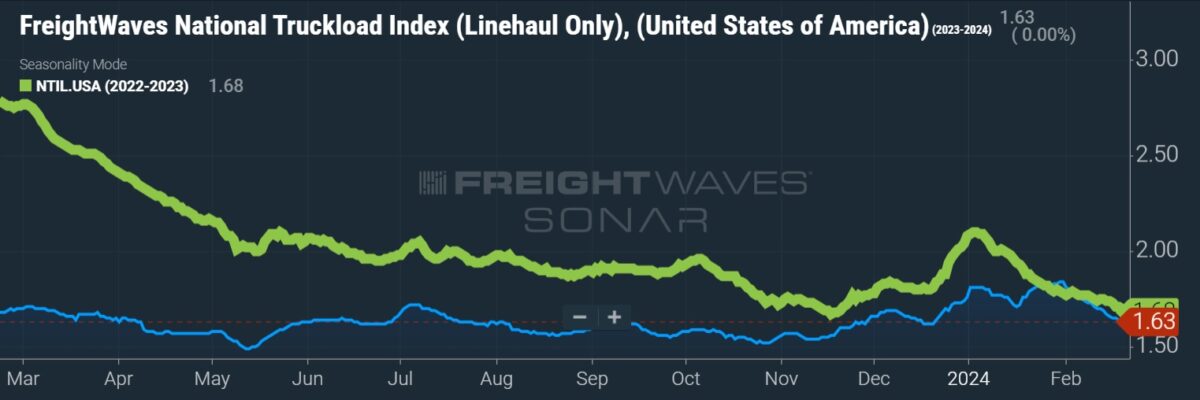A bout of harsh winter weather temporarily pushed truckload metrics higher in January, but fundamentals have receded back to trough levels, carriers said at a pair of investor conferences this week.
J.B. Hunt Transport Services (NASDAQ: JBHT) said its intermodal volumes have not been as strong as the increases reported at the ports of Los Angeles and Long Beach in January, where volumes were 20% higher year over year (y/y), or at its primary rail partner BNSF (NYSE: BRK-B), which witnessed a similar surge. The company also said that bid season for its intermodal and asset-light truck offerings has been “very competitive,” implying pricing remains under pressure.
The comments surprised the market on Tuesday as J.B. Hunt’s stock fell 5.7% compared to the S&P 500, which was down 0.6%. By midday Wednesday, the stock had recouped some of the loss, up 1.9%.
“Pricing in the one-way parts of our business … are unsustainable. The market has to give,” J.B. Hunt President Shelley Simpson said at Barclays investor conference on Wednesday. “Our cost and the inflation around our cost in the lowering price environment just does not bode well from a market perspective.”
Simpson said both intermodal and TL negotiations have been tougher than expected so far and that brokerage conversations have been difficult, but as expected. She said it’s tough to say when the freight recession will end, noting it’s month 21 of the downcycle (defined as spot rates below carrier costs), three months longer than the average downturn.
J.B. Hunt has completed just 20% of its annual contract negotiations.


Management from Werner Enterprises (NASDAQ: WERN) classified bid season for its one-way offering as “very competitive” as well. It said it has worked through less than 20% of its total bids and that “only a handful of bid events” have been finalized.
The comments came Wednesday at Citi’s investor event.
Werner saw a lift in spot rates in its one-way segment during January as winter storms forced operators to temporarily park trucks in some regions. However, the improvement in rate was offset by weaker equipment utilization and incremental costs associated with operating under harsher conditions.
Werner’s one-way fleet currently has a mid-teen-percentage exposure to the spot market.
Its dedicated business, which accounts for two-thirds of the company’s total fleet, is seeing pressure on contract renewals but to a lesser degree as most contracts are indexed to consumer price and labor cost data sets. Also, the contracts are three to five years in duration, limiting downside to the current rate environment. Total truck demand within dedicated accounts has stepped lower as industry capacity remains abundant.
Indications from Werner’s customers show inventories are largely in line with demand for now. The carrier said none of its customers are signaling a need for “what-if” stock, but management believes some may again contemplate a just-in-case approach given a higher frequency in geopolitical events disrupting supply chains.
Werner has guided for its total TL fleet count to be down 3% to flat y/y in 2024. It said its truck brokerage business will likely see a “steady floor through February,” traditionally the weakest month of the year, with some seasonal improvement by spring.
Management said they will look to tender rejections and changes in spot rates as signs of an inflection. It expects some improvement in the spot market during the second quarter.
Shares of WERN were up 0.7% at 2:27 p.m. EST Wednesday compared to the S&P 500, which was off 0.4%.








James Bauman
Could these companies played smartest by completing bids earlier; before today’s extreme low’s? I said they should on X; going back a year. “Put in a reasonable bid NOW; before it gets worse.” I included the likes of Shelly (JBH) but never got response. And Craig.
Carolyn Watson
Look, the truckers are supplying the equipment, the talent, the expertise and the time. Since brokers are the gateway to the loads it should be the brokers batting for the truckers. We are owner operator and cannot run for under $ 2 a mile, the cost to maintain equipment and the cost of fuel and insurance is barley covered by $2. Brokers – step up!